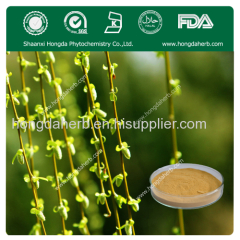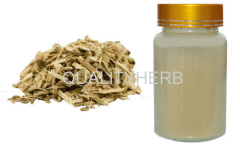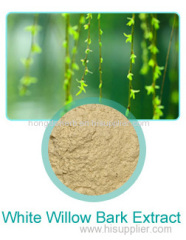
White Willow Bark Extract
| Min. Order: | 1 Kilogram |
|---|---|
| Payment Terms: | L/C, D/P, D/A, T/T, WU |
| Supply Ability: | 1000kg |
| Place of Origin: | Shaanxi |
Company Profile
| Location: | Xi'an, Shaanxi, China (Mainland) |
|---|---|
| Business Type: | Manufacturer, Trading Company |
| Main Products: | Plant Exract, Herbal Extract |
Product Detail
| Model No.: | GLBT-024 |
|---|---|
| Means of Transport: | Ocean, Air, Land |
| Brand Name: | GLBT |
| Name:: | White Willow Bark Extract |
| Appearances:: | Yellow Brown or off-white fine powder |
| Spec:: | Salicin 15% 25% 50% 98% |
| Analysis:: | HPLC |
| Packing:: | Packed in paper-drums and two plastic-bags inside or as per your request. Suitable for air or sea courier. |
| Net weight:: | 25kg /drum |
| Storage:: | Stored in a cool and dry well-closed container, keep away from moisture and strong light/heat. |
| CAS No:: | 138-52-3 |
| Place of Original:: | Shaanxi China |
| Extraction Type: Solvent Extraction: | Solvent Extraction |
| Production Capacity: | 1000kg |
| Packing: | Packed in paper-drums and two plastic-bags inside or as per your request. |
| Delivery Date: | 5-10 working days |
Product Description
Number: GLBT-024
Name: White Willow Bark Extract
Botanical name:Salix alba L.
Type: Antisepsis and anti-inflammation
Source: Branch
Place of Original: Shaanxi China
Appearances: Yellow Brown or off-white fine powder
Extraction Type: Solvent Extraction
Spec: Salicin 15% 25% 50% 98%
Analysis: HPLC
Molecular formula: C13H18O7
Molecular weight: 286.28
CAS No: 138-52-3
Packing: Packed in paper-drums and two plastic-bags inside or as per your request. Suitable for air or sea courier.
Net weight: 25kg /drum
Storage: Stored in a cool and dry well-closed container, keep away from moisture and strong light/heat.
Function and usage:
Salicin is a bitter, white, crystalline or powdery glucoside,which acts as a precursor compound for the synthesis of acetyl salicylic acid.We obtaine it from the bark of white willows.
Salicin is helpful for mild feverish colds and infections (influenza), acute and chronic rheumatic disorders, mild headaches, and pain caused by inflammation.
Salicin is used in medicine for the same purposes as salicylic acid and the salicylates. It is also used as a bitter tonic, i.e. a gastric stimulant, in doses of five grains. The ordinary dose may go up to forty grains or more with perfect safety, though the British Pharmacopoeia limits it to twenty. The remote action of the drug is that of salicylic acid or the numerous compounds that contain it.
Salicin is helpful for mild feverish colds and infections (influenza), acute and chronic rheumatic disorders, mild headaches, and pain caused by inflammation.
Salicin is used in medicine for the same purposes as salicylic acid and the salicylates. It is also used as a bitter tonic, i.e. a gastric stimulant, in doses of five grains. The ordinary dose may go up to forty grains or more with perfect safety, though the British Pharmacopoeia limits it to twenty. The remote action of the drug is that of salicylic acid or the numerous compounds that contain it.
Safety concerns
Because white willow bark contains salicylates, the same precautions as aspirin should be taken until research has shown otherwise. The following people should not take white willow bark:
People with an aspirin allergy or sensitivity. There has been a published report of a 25 year old woman who was admitted to emergency with anaphylaxis after taking 2 capsules of a weight loss supplement that contained willow bark. The patient had a history of allergy to acetylsalicylic acid. No other possible causes for anaphylaxis were identified in that patient.
People with peptic ulcer disease or kidney disease.
The herbs ginkgo, vitamin E, and garlic may increase the risk of bleeding if combined with white willow.
People with hyperuricemia, gout, and asthma.
Children and teenagers, especially with flu-like symptoms, chicken pox, or Reye's syndrome.
Pregnant or nursing women.
White willow bark should be avoided two weeks before or after surgery.
Side effects
There have been few reported side effects. However, the same side effects as aspirin may theoretically occur, especially at higher doses: ringing in the ears, ulcers, stomach burning, pain, cramping, nausea, gastrointestinal bleeding and liver toxicity, rash, dizziness, and kidney impairment.







.gif)